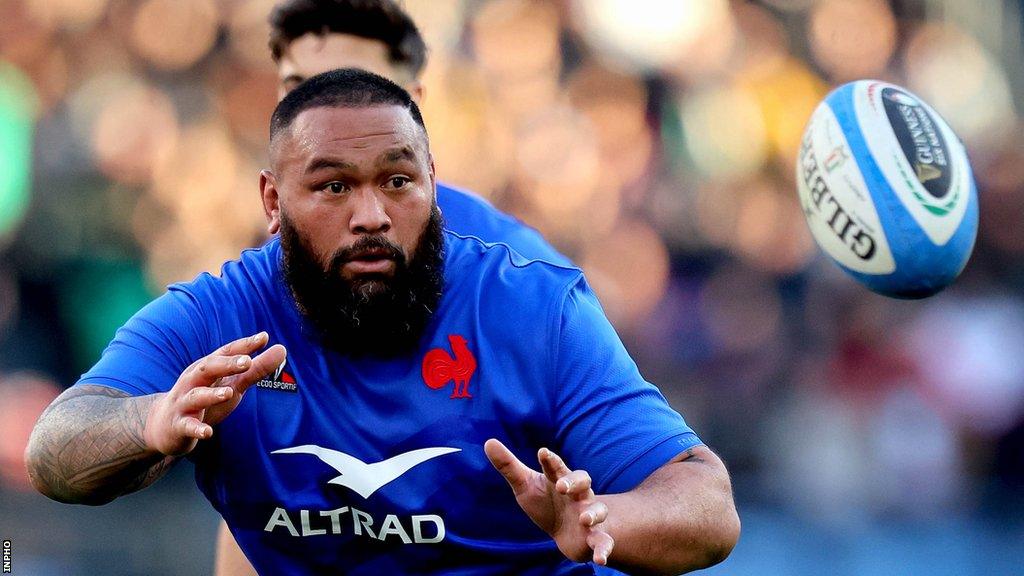Tommy Bowe column: Rugby must fix high-tackle issue, but red cards aren't the way forward
- Published

There has been plenty of talk about Ireland's performance against France, so I'd like to talk about Uini Atonio's tackle on Rob Herring.
On social media, I've read how Wayne Barnes' failure to give the French prop a red card is an example of rugby ruining itself.
I don't necessarily agree. For me, one of the best Six Nations games we've ever seen would have been ruined by Atonio's dismissal.
Yes, a red card probably would have been the right decision, but why should the whole spectacle suffer and 50,000-plus fans who shelled out more than 100 euros (£88) for a ticket be left short-changed as a result of one player's stupidity?
Look, rugby needs to sort out high tackles and concussion, but this is a spectator sport and I'm not convinced handing out red cards for these types of incidents is the way to do it.
For me, World Rugby needs to seriously consider introducing a yellow card where the player goes on report like in rugby league - an orange card, if you like - whereby the offending player is dismissed and the replacement comes on after 10 minutes.
If that had been in place on Saturday, Atonio would not have been allowed to re-enter the play but the replacement prop could have come on after 10 minutes. That way, Atonio and France would have been penalised but the game would have been kept alive as a contest.
Red cards ruin big games. Remember Sam Warburton being sent off just 18 minutes into Wales' 2011 World Cup semi-final defeat by France? We don't want a repeat of that in France this year.
The Atonio-Herring incident got me thinking of Joey Carbery, too. Carbery was comfortably Ireland's second-choice fly-half when the November internationals rolled around, and was duly offered a rare chance to step out of Johnny Sexton's shadow against Fiji.
And Carbery was going well until he took a reckless high hit from Albert Tuisue.
The Fijian flanker was sent off and subsequently banned for four weeks, but the consequences for Carbery have been far greater. He failed an HIA and missed the win over Australia when Jack Crowley started and Ross Byrne stole the headlines by kicking a late match-winning penalty.
Now Carbery finds himself out of the Ireland squad just seven months out from the World Cup. Atonio has been cited and may receive a four-week ban, but most players would relish that. Think about how intense the game is these days, playing 30-plus games each season. A four-week suspension is almost like a holiday to let the body recover.
It's time to stop players making high tackles by punishing them harder. Repeat offenders who are giving away multiple yellow or red cards must get the book thrown at them with hefty fines and lengthy bans.
If a player knows that a severe punishment could come their way, they would think twice before going high again. I know that if the prospect of being suspended for a World Cup was in my head, I'd definitely make sure to drop my tackle height.
To make a change, you have to hit players where it hurts.

France prop Uini Atonio will attend a disciplinary hearing on Wednesday after being cited for his tackle on Rob Herring
When Martin Johnson speaks, you listen
As for Ireland, the Grand Slam and the World Cup, I found myself thinking of a call I was on recently with my fellow BBC pundits prior to the start of the Six Nations.
Martin Johnson was on it. When Jonno talks, people listen, and something he said really struck me.
Jonno argued that Ireland must prove themselves as Grand Slam winners before winning the World Cup. Obviously Ireland don't need to win the Grand Slam to win the big one later this year, but Johnson has been there and done that.
He was part of the England team that completed the Grand Slam-World Cup double in 2003 so he has the medals to prove he knows what he is talking about.
Another man who knows what he's talking about is Ryanair boss Michael O'Leary. I remember, during the Joe Schmidt era, my Ireland team-mates and I met with O'Leary, who gave us a bit of a grilling.
"Why are you not the best in the world? Why have you not beaten the All Blacks? Why haven't you won the World Cup?"
Six Nations highlights: Brilliant Ireland beat France in thrilling game
He told us it was all about setting targets, achieving them and moving on to the next one. At that stage we'd never beaten the All Blacks and had only won one Grand Slam since 1948. I thought he was mad - most of us probably did.
But look at what Ireland have done since. They've kept setting targets and ticking them off. Another Grand Slam? Tick. Beat New Zealand for the first time? Tick. Win a Test series against the All Blacks in New Zealand? Tick. Have a sustained period as the world's number-one side? Tick.
Rattling through these targets only bolsters Ireland's belief that they can reach more heights. You could see that belief in the team on Saturday. Restricting that star-studded French team to one try was amazing.
Beating France to me shows how Ireland are comfortable with being the best team in the world. Being comfortable with that will help them win a World Cup.
So, too, will winning the Grand Slam according to Jonno - and who are we to argue with him?
Tommy Bowe was speaking to BBC Sport NI's Matt Gault